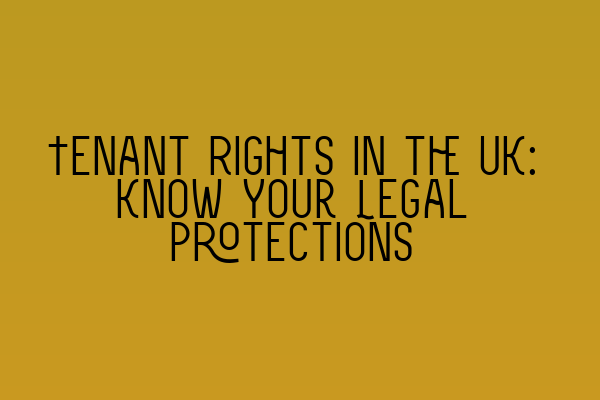Tenant Rights in the UK: Know Your Legal Protections
As a tenant in the UK, it is important to understand your rights and the legal protections available to you. Renting a property can come with various challenges, but knowing your rights can help ensure a fair and secure tenancy. In this article, we will explore some of the key tenant rights in the UK.
1. Right to a Written Agreement:
Before moving into a rented property, it is essential to have a written tenancy agreement in place. This agreement outlines the terms and conditions of the tenancy, including the rent amount, payment schedule, and tenancy duration. It is crucial to thoroughly read and understand this document before signing it. If you have any questions or concerns, seek legal advice to ensure that your rights are protected.
2. Right to Deposits Protection:
When renting a property in the UK, landlords are required to protect tenants’ deposits in a government-approved deposit protection scheme. This scheme ensures that the deposit is held securely and returned to the tenant at the end of the tenancy, provided there are no damages or unpaid rent. If the landlord fails to protect your deposit within 30 days of receiving it, they may be liable to pay you compensation. It is important to check if your deposit has been protected and request the necessary information from your landlord.
3. Right to a Safe and Habitable Property:
As a tenant, you have the right to live in a safe and habitable property. Landlords have an obligation to ensure that the property meets certain standards, such as having a valid gas safety certificate, working electrical and heating systems, and adequate fire safety measures. If your landlord fails to address maintenance issues that affect your health and safety, you can take legal action or report them to the local authorities.
4. Right to Privacy:
While landlords have a right to access the property for repairs or inspections, tenants also have a right to privacy. Landlords must provide at least 24 hours’ notice before entering the property, except in cases of emergency. Your landlord should respect your privacy and not unnecessarily interfere with your use and enjoyment of the property.
5. Right to Challenge Unfair Rent Increases:
Under UK law, landlords can only increase the rent if there is a valid reason and by following the correct procedure. They must provide you with a written notice specifying the new rent amount and the date it will take effect. If you believe the rent increase is unfair, you have the right to challenge it by negotiating with the landlord or referring the matter to a rent tribunal.
Knowing and asserting your rights as a tenant is crucial to maintaining a healthy landlord-tenant relationship. Taking the time to familiarize yourself with these rights can help you avoid potential issues and protect your interests. If you ever have any questions or concerns regarding your tenancy, it is advisable to seek legal advice to ensure you are fully informed of your rights and the available options.
For more information on related topics, please check out the following articles:
– Understanding Contractual Capacity: Rights and Limitations
– Interactive SQE Mock Tests for Contract Law: Test Your Knowledge
– Join Our SQE Contract Law Webinars: Expert Insights and Guidance
– Contract Law Reforms: An Analysis of Recent Changes
– Parties in a Contract: Rights and Responsibilities
At SQE Property Law & Land Law, we are committed to providing expert legal advice and guidance to tenants. Our team of experienced solicitors can help you understand your rights, handle any tenancy disputes, and ensure you receive the necessary legal protections. Contact us today to book a consultation and protect your rights as a tenant.
